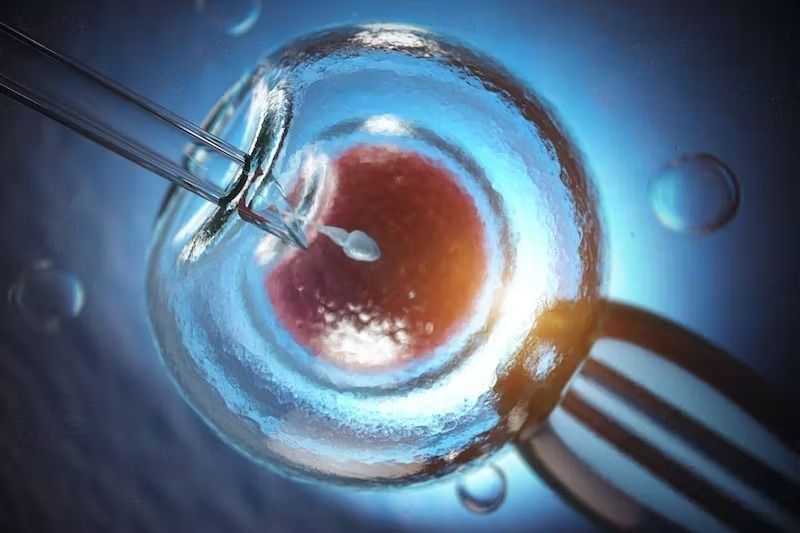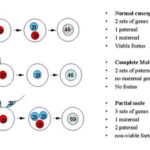
In vitro fertilization also known as IVF is a type of fertility treatment for those couples who are trying to conceive. It involves the fertilization of an egg in a laboratory condition, outside the womb of a woman. Once the egg is successfully fertilized, it is then implants in the uterus. This technique is a kind of assisted reproductive technology, which is a term that includes various methods of treating infertility by focusing on both sperms and eggs. There are many false impressions associated with in vitro fertilization, and it is very necessary to keep yourself informed if you are planning to go for one of the fertility treatments to conceive a baby.
In vitro fertilization may not be the first choice of the couples who are struggling with infertility. Many couples use fertility medications to deal with their problem. Whereas in few cases, surgery is suggested for those females who have abnormalities in the structure of their uterus or fallopian tubes. Most of the couples even change their lifestyle by changing diet, reducing stress and avoiding hot baths. When all such steps fail, then many couples go for in vitro fertilization.
Steps Involved in In-Vitro Fertilization
1. Preparing for IVF: Initial Consultation and Assessments
Before commencing your in vitro fertilization journey, it’s crucial to schedule an initial consultation with a fertility specialist. During this comprehensive assessment, the medical team will evaluate your medical history, conduct necessary tests, and assess both partners’ fertility. These assessments include hormone level evaluations, semen analysis, and ultrasound examinations.
2. Ovarian Stimulation: Boosting Egg Production
To maximize the chances of successful fertilization, the ovaries need to produce multiple eggs. This is achieved through ovarian stimulation, which involves the administration of fertility medications. These medications help stimulate the ovaries to produce a greater number of mature eggs, increasing the likelihood of successful fertilization during the IVF process.
3. Monitoring and Follicle Development
Throughout the ovarian stimulation phase, regular monitoring is essential. This typically involves transvaginal ultrasounds and blood tests to assess the development of follicles within the ovaries. Monitoring enables the medical team to determine the optimal timing for egg retrieval.
4. Trigger Shot: Preparing for Egg Retrieval
Once the follicles have reached the desired size and maturity, a trigger shot is administered. This injection, typically of human chorionic gonadotropin (hCG), triggers the final maturation of the eggs within the follicles. Egg retrieval is scheduled within a specific timeframe after the trigger shot to maximize the chances of successful fertilization.
5. Egg Retrieval: Obtaining the Precious Eggs
Under sedation, a specialized fertility doctor will perform the egg retrieval procedure. Utilizing ultrasound guidance, a thin needle is inserted through the vaginal wall to access the ovaries. The follicular fluid is aspirated, and the eggs are carefully collected.
6. Sperm Collection and Preparation
On the same day as the egg retrieval, the male partner provides a semen sample. The semen is then prepared in the laboratory through a process called sperm washing, which separates the healthy sperm from the seminal fluid.
7. Fertilization: The Union of Egg and Sperm
After the sperm preparation process, the eggs and sperm are brought together in the laboratory. There are two main methods of fertilization: conventional in vitro fertilization, where the sperm is combined with the eggs in a culture dish, or intracytoplasmic sperm injection (ICSI), where a single sperm is injected directly into each egg.
8. Embryo Culture: Nurturing New Life
Following fertilization, the resulting embryos are cultured in a controlled laboratory environment. The embryologists carefully monitor their development and assess their quality, aiming to select the most viable embryos for transfer.
9. Embryo Transfer: The Journey to the Womb
Embryo transfer is a relatively painless procedure that involves the placement of one embryo or, in certain cases, multiple embryos into the woman’s uterus. Using a catheter, the embryos are carefully guided through the cervix and into the optimal location within the uterine cavity.
10. The Two-Week Wait: Patience and Hope
Following the embryo transfer, the eagerly anticipated two-week wait begins. During this period, you will be advised to rest and avoid strenuous activities. It is important to maintain a positive mindset while patiently waiting for signs of pregnancy.
11. Pregnancy Testing: Determining the Outcome
After the two-week wait, a blood test or home pregnancy test is conducted to determine if the in vitro fertilization cycle was successful. This moment brings a mix of excitement, anticipation, and perhaps some anxiety. The results will provide clarity on whether conception has occurred.
12. Implantation and Early Pregnancy
If the IVF cycle is successful, the embryo implants itself into the uterine lining, and pregnancy begins. The early stages of pregnancy are crucial, and regular monitoring through blood tests and ultrasounds will be scheduled to ensure the pregnancy progresses as expected.
13. Factors Affecting IVF Success: Age and Reproductive Health
Several factors can influence the success of an in vitro fertilization cycle. Age plays a significant role, with younger individuals typically having higher success rates. The overall reproductive health of both partners, including factors such as egg quality, sperm quality, and uterine health, also impact the chances of success.
14. Lifestyle Factors: Optimizing Your Chances
While certain factors are beyond our control, lifestyle choices can significantly influence the success of in vitro fertilization. Maintaining a healthy weight, avoiding tobacco and excessive alcohol consumption, managing stress levels, and incorporating regular exercise into your routine can all contribute to optimizing your chances of a successful outcome.
15. Success Rates: Understanding the Numbers
In vitro fertilization success rates vary depending on several factors, including age, underlying medical conditions, and the specific clinic’s expertise. It is important to have a thorough discussion with your fertility specialist to understand the success rates relevant to your unique circumstances.
16. Multiple Embryo Transfer: Weighing the Risks and Benefits
In some cases, the transfer of multiple embryos may be recommended to increase the chances of success. However, this approach carries a higher risk of multiple pregnancies, which can pose additional challenges and complications. It is crucial to have an open and honest discussion with your doctor to make an informed decision.
17. Frozen Embryo Transfer (FET): An Alternative Approach
Cryopreservation allows embryos that were not transferred during the initial cycle to be preserved for future use. Frozen embryo transfer (FET) offers an alternative to fresh embryo transfer, providing individuals and couples with additional opportunities for successful pregnancies.
18. Genetic Testing: Enhancing IVF Success
Genetic testing techniques, such as preimplantation genetic testing (PGT), can be utilized to assess the genetic health of embryos before transfer. By selecting embryos with the desired genetic characteristics, the chances of a successful pregnancy can be further enhanced.
19. Emotional Support: Nurturing Your Well-Being
The journey of in vitro fertilization can be emotionally challenging, filled with a range of emotions, from hope and excitement to disappointment and frustration. Seek support from your partner, loved ones, and professional counseling services to help navigate the emotional rollercoaster and nurture your well-being throughout the process.
20. Financial Considerations: Understanding the Costs
IVF can be a significant financial investment. It is important to have a clear understanding of the costs involved, including fertility consultations, medications, procedures, and potential additional treatments. Explore insurance coverage options and consider financial planning to alleviate any financial stress.
Success of In Vitro Fertilization
This process is more successful if a woman is healthy and fertile, which shows that age of a woman is an important factor in the success of in vitro fertilization. The in vitro fertilization process has worked if a pregnancy test is positive within two weeks of the embryo being implanted into the uterus.
No doubt, in vitro fertilization procedure is very helpful for the couples unable to naturally conceive. It was initially developed to help women who have blocked or damaged fallopian tubes, and this is the best method for them to start a family. However, it is very important for the couple to be fully aware of the risks and side effects involved with this type of treatment.
Related: Pregnancy Options and Chances After Tubal Ligation
Conclusion
In vitro fertilization (IVF) offers individuals and couples a remarkable opportunity to realize their dreams of parenthood. By understanding the intricate steps involved in the IVF process and the factors that contribute to its success, you can embark on this journey with confidence. Remember to seek support, prioritize your emotional well-being, and trust in the expertise of your fertility specialist. Each In vitro fertilization journey is unique, filled with hope, resilience, and the potential for a joyous outcome.
Frequently Asked Quetions (FAQs)
How long does the entire IVF process take?
The duration of the IVF process varies from person to person. Typically, it spans four to six weeks, including the preparatory phase, ovarian stimulation, egg retrieval, embryo culture, and transfer.
What are the risks associated with IVF?
Like any medical procedure, IVF carries certain risks. These may include ovarian hyperstimulation syndrome (OHSS), multiple pregnancies, ectopic pregnancies, and potential side effects from medications. Your fertility specialist will discuss these risks with you and take necessary precautions to minimize them.
What are the chances of success with IVF?
Success rates vary depending on several factors, such as age, overall health, and the specific circumstances of the individuals or couples undergoing IVF. It is best to consult with your fertility specialist to understand your personal chances of success.
Can I continue with my regular activities during IVF treatment?
While it is important to maintain a balanced and healthy lifestyle, your fertility specialist may recommend modifications during certain phases of the IVF process. It is advisable to follow their guidance and avoid activities that could potentially impact the success of the treatment.
Are there any alternatives to IVF?
Depending on your specific fertility issues, there may be alternative treatments or procedures that could be explored. It is essential to consult with a fertility specialist to discuss the available options and determine the most suitable course of action for your unique situation.
What if the first IVF cycle is unsuccessful?
IVF success is not guaranteed in the first cycle for everyone. If the initial cycle is unsuccessful, it can be emotionally challenging, but it is important to remember that multiple cycles may be necessary to achieve pregnancy. Your fertility specialist will assess the results and recommend appropriate steps for subsequent attempts.














